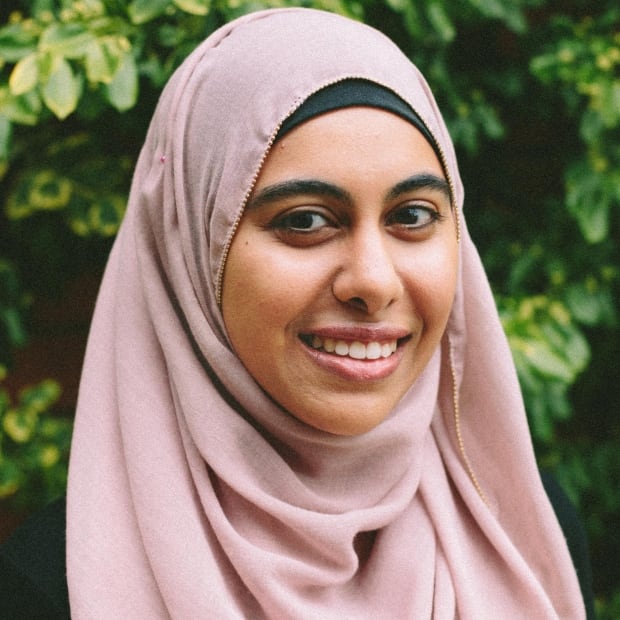
- Poste occupé:
- Program Officer
- Organisation:
- Inspirit Foundation
- Type de formation (1):
- Formation universitaire (Maitrise)
- Programme de formation (1):
- Master’s degree from York University in Development Studies
- Types de professionnel-le:
- Professionnels-les dans les OBNL et OBE
- Secteurs d'organisation:
- Art et culture
- Types d'organisation:
- Fondations publiques
Can you present yourself?
I see myself as a community connector, which means I am always looking to bridge gaps and foster collaborations that will address the exclusion of racialized communities from access to resources and decision-making processes that affect them. While I currently work in philanthropy, my background is in political and community organizing against Islamophobia, something I’ve been doing in various roles since about 2014.
What brought you to work in the philanthropic sector?
My experiences throughout my teens and early twenties—as a child of immigrant settlers to Dish with One Spoon Treaty territory, a racialized person, a visible Muslim woman, and someone with lots of ideas —led me down the road of grassroots community work, where I had the opportunity to lead innovative projects and also liaise with many funders. During this time, it became clear to me that funding is not always responsive to the most pressing needs of communities experiencing racism and discrimination on the ground. I thought this context presented an opportunity for someone with my background to play a part, and so here I am.
Can you define and explain what your activity and/or position consists of within your organization?
As the Program Officer, I lead and administer Inspirit’s granting streams in support of change leaders, who are racialized, Indigenous and Muslim people aged 18-34 working to address racism and discrimination in their communities. This includes program design, outreach, assessing applications, grantee intake, supporting grantees through their journey, as well as evaluating projects. I currently support over 50 Inspirit supported projects across what we now refer to as Canada.
What is your professional education? Is it relevant in the context of your philanthropic involvement? Why?
I have an undergraduate degree from the University of Toronto in Economics and Political Science, and a Master’s degree from York University in Development Studies. I would say my Master’s degree is most relevant to my current role in philanthropy as it’s provided theoretical grounding in monitoring and evaluating frameworks, involving communities in programming in good ways, and critically engaging with systems and power.
Talk to us briefly about your professional background?
I’ve worked across sectors, always with an eye to shifting imbalances in power relations. With smaller, grassroots organizations, I’ve organized youth around issues that are important to them during the 2015 federal election, and currently volunteer with initiatives like the Muslim Youth Fellowship to promote civic engagement among Muslim youth. I’ve also worked within larger, established non- profits such as OCASI that are at the forefront of anti-racism initiatives in Ontario, and then as a political staffer at the City of Toronto, where I collaborated with elected representatives, constituents and stakeholders to pass a Day of Remembrance and Action on Islamophobia, in response to the tragic events of January 29, 2017 at the Centre Culturel Islamique de Quebec.
What are the challenges and issues related to your position in philanthropy?
I think a major challenge for many foundations is ensuring that funding is responsive to the needs of racialized communities experiencing systems and structures—like the justice system or the education system— that were designed to exclude them. I ‘ve joked about this with colleagues when I worked at grant-seeking organizations. The issues don’t always get addressed, it’s the funding that gets addressed. For the young Indigenous, Muslim and racialized leaders that I work with in my current role, many of whom do not have the kinds of social capital and generational wealth that can provide access to additional funding, this poses a challenge when we’re thinking about growing their projects and leadership to the next level. This, in turn, means the ecosystem of established leaders at the forefront of innovation and addressing racism and discrimination in Canada is often less vibrant and diverse than it can be.
How would you define philanthropy today? How does this definition influence your working methods?
In my experience, philanthropy is, by its nature, more risk tolerant than for instance, government or the business sector. This creates huge opportunities for us as a sector to be innovative in our approaches to social issues like addressing racism. By this, I mean philanthropy can be more open to different ways of doing things, by bringing in and prioritizing more leaders and voices that aren’t otherwise heard, being innovative about how programs are designed and whom they cater to. We can also drive shifts in how the world thinks about measuring project success and impact. In terms of how this influences my work, it keeps me inspired and hopeful for the future of philanthropy.
What advice would you give to someone who wishes to pursue a career in your profession/activity?
A significant component of my journey has been the mentorship of established leaders in my areas of focus who are my champions and support network. These are people that I turn to for help navigating particular challenges, and who will leverage their privilege to support me in whatever way they can. I would advise younger, racialized women in particular to find these allies and mentors in the spaces they occupy, as they can contribute significantly to any career journey.

